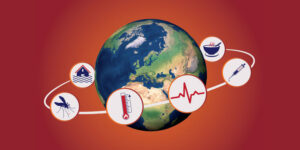When we think of the aspects of our world affected by climate change what comes to mind? To most, it’s increasing temperatures, rising sea levels, and changes to natural occurrences. However, aside from the polar caps slowly melting away and the thousands of species put at risk for extinction, climate change has been identified to have taken its toll on some of the world’s most profitable industries. It seems as though before our planet’s ecosystem is fully destroyed by global warming, the industries our society relies upon will fall apart.
Agriculture
At first thought, some may believe that the rising temperature may result in an agricultural bloom, but that is not the case for many crops. For many types of crops, like grain, higher temperatures hinder their proper growth, and in turn, yield fewer crops. A study conducted by the United Nations in 2014 predicted that the price of produce could rise 84 percent by 2050 as the effects of global warming continue to plague the world.
Another concern in the agricultural industry, as well as others, is the use of water. The global population is consistently rising, and crops are needed to supply them with food. That considered, the water sources across the different continents aren’t distributed in a fashion that accommodates the population size of the countries. The lack of water to grow plants locally, coupled with an increased amount of droughts, is placing a massive strain on the agricultural industry in certain areas.
Beverages
Water is also an element of concern in the beverage industry. Climate change has lessened the amount of pure water available for industrial use, and as the soft drink and bottled-water markets rely heavily on it for their functionality, these industries, currently valued at $247 billion, could be on a decline. In addition, for companies like Coca-Cola, the cost and availability of raw materials like sugarcane and sugar beets is impacted by the incompatible weather conditions and shifting patterns. A large sum of the markets in the beverage industry are being affected in this way.
Wine
Unlike the agriculture and beverage industries, the wine industry most likely won’t weaken or diminish as a result of climate change. Instead, the geographical portrayal of prosperous wineries may change. With rising temperatures, the growth and production of wine grapes will greatly diminish in traditional wine areas as wine grapes are very sensitive to climate change. It is predicted that there will be a two-thirds drop in wine production in typical wine areas. Other regions could then emerge as constituents in the wine industry.
Fishing
The ocean and ocean life are arguably the greatest sufferers of climate change. Rising sea levels, ocean acidification, and heat-trapping pollutants do nothing but harm the populations of fish such 15as salmon and trout, along with the many other species relied upon by the fishing industry. Habitat loss and declining fish populations would result in a tremendous loss for the fishing industry, which is valued around $1.5 to $14 billion, yearly.
Due to global warming and the current state of our planet, these industries, and many more, are facing an abundance of hardships, with more to come. To say the least, climate change needs to be taken under control before some of our society’s most valuable industries are lost.
Resources:
https://www.cnbc.com/2014/10/22/7-industries-at-greatest-risk-from-climate-change.html
https://www.bsr.org/reports/BSR_Climate_Adaptation_Issue_Brief_Food_Bev_Ag2.pdf


